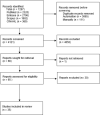Economic evaluations of non-communicable diseases conducted in Sub-Saharan Africa: a critical review of data sources
- PMID: 37641087
- PMCID: PMC10463745
- DOI: 10.1186/s12962-023-00471-7
Economic evaluations of non-communicable diseases conducted in Sub-Saharan Africa: a critical review of data sources
Abstract
Background: Policymakers in sub-Saharan Africa (SSA) face challenging decisions regarding the allocation of health resources. Economic evaluations can help decision makers to determine which health interventions should be funded and or included in their benefits package. A major problem is whether the evaluations incorporated data from sources that are reliable and relevant to the country of interest. We aimed to review the quality of the data sources used in all published economic evaluations for cardiovascular disease and diabetes in SSA.
Methods: We systematically searched selected databases for all published economic evaluations for CVD and diabetes in SSA. We modified a hierarchy of data sources and used a reference case to measure the adherence to reporting and methodological characteristics, and descriptively analysed author statements.
Results: From 7,297 articles retrieved from the search, we selected 35 for study inclusion. Most were modelled evaluations and almost all focused on pharmacological interventions. The studies adhered to the reporting standards but were less adherent to the methodological standards. The quality of data sources varied. The quality level of evidence in the data domains of resource use and costs were generally considered of high quality, with studies often sourcing information from reliable databases within the same jurisdiction. The authors of most studies referred to data sources in the discussion section of the publications highlighting the challenges of obtaining good quality and locally relevant data.
Conclusions: The data sources in some domains are considered high quality but there remains a need to make substantial improvements in the methodological adherence and overall quality of data sources to provide evidence that is sufficiently robust to support decision making in SSA within the context of UHC and health benefits plans. Many SSA governments will need to strengthen and build their capacity to conduct economic evaluations of interventions and health technology assessment for improved priority setting. This capacity building includes enhancing local infrastructures for routine data production and management. If many of the policy makers are using economic evaluations to guide resource allocation, it is imperative that the evidence used is of the feasibly highest quality.
Keywords: Costs; Data sources; Economic evaluations; Non-communicable diseases; Sub-Saharan Africa.
© 2023. BioMed Central Ltd., part of Springer Nature.
Conflict of interest statement
The authors declare that they have no competing interests.
References
-
- World Health Organization. : SDG Target 3.8 | Achieve universal health coverage, including financial risk protection, access to quality essential health-care services and access to safe, effective, quality and affordable essential medicines and vaccines for all. 2023.
LinkOut - more resources
Full Text Sources
Research Materials


